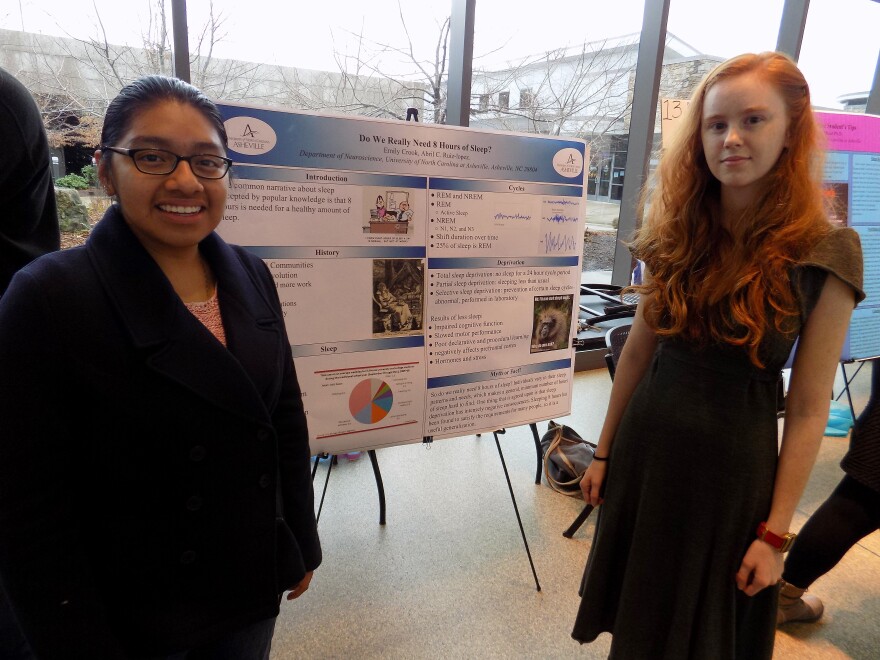A steady buzz of conversation fills the concourse at UNCA’s Sherrill Center.

The scene is the standard long line of students in front of poster presentations during the Undergraduate Research and Community Engagement Symposium. The conversation, however, is anything but standard.
“The purpose of this project is to show off neuroscience in everyday life, and we figured, what better example than a genuine Cyborg,” says freshman presenter Logan Varker. His research partner Jack Raney explained that this genuine Cyborg, is avant-garde artist Neil Harbisson, who chose to correct his colorblindness with a device called an Eyeborg.
“It’s a device that has a photo-diode array that can read different wavelengths of light, transmits it into electronic signals that goes to an audio element that’s implanted into the back of his head, “ say Raney.
The implant translates color into tones. “For him, red is a musical note,” says Raney.
“ His device can actually connect to the internet,” explained Varkin, “and so he has a list of four people who can send him images directly to his Eyeborg and I think that is interesting because that expands our ability to connect around the globe.”
Hannah Henkin’s presentation is the science behind online study tips, came from personal experience.
“I was scrolling through Pinterest,” says Henkin, “This is my first semester, and so I was like, how do I get good grades. I was going through all these study tips and I was like, this sounds interesting.”

HC “Online study tips totally bogus?”
“Not all of them, but a lot of them kind of were.”
Like the one that says the best time to study is at 4 a.m., but Henkin’s research did uncover a few keepers.
“If you have more oxygen in your blood you have better more memory performance, they tested this by having people breathe different concentrations of oxygen.”
Meditation, says Henkin, lacked scientific support as a study tool says Henkin, but did have other brain benefits.
“It makes your brain appear (on brain scans) if you’ve been doing it a long time, seven years younger, so it protects against brain atrophy, so that was cool. So I have a long list of things I have to do, I have to do my breathing exercises, I have to do meditation!”
Nature was the theme at the other end of the concourse. Senior Robert Chambliss and his partner junior Shannon Bodeau have been studying the genetics and habitat of a salamander found in the high elevation forests of WNC and Virginia.
“This is rare species, a NC species of special concern. It might be threatened, it might be endangered, there’s not actually enough data to establish that kind of data.”
Chambliss and Bodeau's research might help. They focused in on habitat factors like soil PH, which can affect Salamander health.
“Even though little change in the climate, if we don’t pay really close attention to conserving these areas, we could extirpate and lead these species to extinction along with a lot of other tree species salamanders that only exist in these special high elevations spruce fir forests,” says Chambliss.
(students playing water glasses)
And the final poster experience, the sound of music, and science.
“The music theory club did a poster presentation on the intersection of music and science. Specifically tuned water glasses to create musical sounds,” says Assistant Professor of Music Christine Boone, who explained that the club tapped the physics department to figure out tuning formulas. Music Major Elijah Brown loved the science behind the project
“This is really cool to me,” says Brown, “getting into the physics of why these glasses sound like they do and what makes each tone happen.”
Project Collaborator and Physics Professor Michael Ruiz, appreciated the music.
“A very beautiful piece that was performed with these glasses,”

A beautiful mix of music and science that was performed on stage with a choir definitely not your standard student poster presentation. For WCQS news, I’m Helen Chickering
The piece featured at the end is Music "Stars" by Ēriks Ešenvalds performed by
University of North Carolina Asheville Singers and Musical Water Glasses played by the University of North Carolina Asheville Music Theory Club Under the direction of Dr. Melodie Galloway. Click here for a list of all the presentations.























